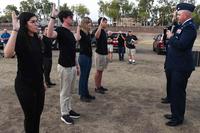Everyone has his opinion, but the experts are usually right. That is why I asked three boot camp experts their basic training tips. Below are their responses:
1. The Minimum Isn't Going to Cut It
Many recruits I speak with assure me they are ready for the physical aspect of basic training. However, I soon discover that their idea of being ready is to perform the minimal sit-ups, push-ups and run time required by the military. Aiming for the minimum standards is not the way to ensure you will succeed.
When physically preparing for basic training, set your goals as high as possible. If you only have two weeks from the time you enlist to the time you ship out for basic, then setting a goal to shave off three minutes from your run time is not practical. But you should set goals that push you to achieve more than the minimum requirement. The only way to achieve your physical goals is to set a workout routine and stick with it. My three tips are: 1. Pick a workout plan specifically designed to get you in shape for basic training (which can be found in any of "The Ultimate Basic Training Guidebooks.'') 2. Set a physical goal to meet before your ship-out date. 3. Keep a log of your daily progress. This will help you stay motivated.
2. Pay Your Bills
Just because you're in basic training, far away from home, doesn't mean the world stops spinning. Believe it or not, your bills for your cellphone, internet, rent and car still need to be made when you're at basic training. If you neglect any bills, they most likely will go to collections. Many jobs in the military require a secret security clearance. One of the many factors considered when approving recruits for a security clearance is their financial standing. Someone with multiple unpaid bills or collection notices probably will not receive a security clearance, which means they may not do the job they signed up for. Instead, they will be assigned to a new career field that does not require a security clearance (and probably a job they did not want).
The best way to avoid any of this is to plan ahead. Many cellphone companies will suspend your contract while you're in basic training. However, some bills must be paid while you're gone. If you're married or have a family member whom you trust, show them what bills you have and how to pay them. Sometimes, assigning a specific power of attorney can be helpful so someone can sign on your behalf. Otherwise, set up all your bills on automatic payment. Then notify the companies of the dates you will be in basic training.
Leave an emergency number with someone in case there is a problem with a payment. I cannot stress this enough: do not give this task to your boyfriend/girlfriend. You might feel like you're in love now, but halfway through basic training, you (or your partner) might fall out of love. Then you're left with a former partner with an open checkbook, access to vital information about you and virtually unlimited time to do damage to your bank account.
3. Study Ahead of Time
When you arrive at basic training, you will be required to learn a massive amount of information within a short amount of time. Each military branch has its own unique rank structure and other information you will be required to memorize such as general orders, current chain of command, etc. Within the first couple of weeks of basic training, you will be grilled on this information, and making a mistake will mean additional attention from instructors.
Don't wait until you get to basic training to start learning what you'll be required to memorize. Do these three steps: 1. Find out what information you will be required to know. 2. Study this information on your own for several days or even weeks if you have that much time. 3. Once you've studied, have someone quiz you on the information. If you know someone else who is joining the military, quiz them. You will retain the information better if you are "teaching" it to someone else.
-- Nick Van Wormer -- The Ultimate Air Force Basic Training Guidebook
1. Channel Your Mental Anxiety and Fear
Mental toughness is a huge battle that must be won. If your mind breaks down, it doesn't matter how ready your body is for basic. Eliminate fear and anxiety with understanding and preparation. Understand that the point of basic training is to break down previous belief systems and build you back up with new ones that align with your team, and preparing physically will assist you in eliminating anxiety and fear.
2. Prepare Your Body For Something Different
If you arrive fit, then the physical demands of boot camp will be a release of stress and not a mental hurdle. You will be tested on push-ups, sit-ups, and run time (some branches even do pull-ups and swimming). Most of the stress and anxiety comes from being timed under these conditions so when practicing before basic training, time your workouts. Don't just go to the gym and prepare your body for the actual exercises you will do at basic training.
3. Define Your Personal 'Mission'
My personal "life mission" is to serve others. It doesn't matter if I'm scrubbing toilets or conducting a fitness class, my philosophy enables me to do it with passion. Whether you joined to protect and serve, be the first in battle or improve your family's position in life, you always can refer back to your personal mission to keep your head and heart in check.
-- Tee Major -- Military fitness instructor and creator of the BW44 Bodyweight Fitness Program
1. Get Your Body into the Correct Sleep Cycle
Getting your body into the correct sleep cycle before you leave will help you adjust to long days and short nights at basic training.
One thing most boot-camp graduates agree on is the importance of getting your sleep cycle in sync with the time zone at your basic training location. Your body already will be fatigued due to the sudden change in time zones. Add to that the rigors of boot camp and near nonstop physical activity, and you can see how important proper sleep is.
Find out the time zone of your basic training location. If you know that while in basic training, the wakeup time is at 0500, then you should adjust your sleep schedule now so that by the time you start basic training, your body will feel accustomed to getting up early.
Don't try to adjust your sleep schedule abruptly. Instead, try going to sleep and waking up an hour early every other day for a week or two. Once your body adapts, try increasing to 1½ hours earlier and so on. This may be easier said than done, but if you can reset your body's sleep cycle, it will allow you to maximize your recovery time.
2. Learn the Fundamentals
By far, the most important thing that you can do before basic training is to learn a few military fundamentals. Much of your time in basic training will be spent with your face in the soldier's manual. If you prepare yourself now by learning the below items, you'll concentrate on the task at hand and will fly under the radar of the drill sergeants. My suggestions for "must-know" items before attending basic training are:
The phonetic alphabet
Military time
Soldier's creed
Warrior ethos
Identify military rank
Learn these, and you'll be ahead of the game and out of the drill sergeant's crosshairs!
3. Brief Your Family About Your Limited Communication
Time will be very limited while you are in basic training. Prepare your family members by informing them you will not communicate with them frequently. When you have a chance to make a phone call, you can bet a drill sergeant will time your conversation to no more than a few minutes. Explain to your family that it may be a few weeks before they hear from you, and once you are allowed to call, it may be the only one they receive for a while. The military does this as part of the transformation process. It is the drill sergeant's duty to transform you from a civilian who knows nothing about military life into a highly trained defender of freedom. By keeping your family informed, you'll have the peace of mind that they aren't worrying about you, which will allow you to focus on completing basic training.
-- Staff Sgt. Joseph Brito -- National Guard recruiter
This article was written by Sgt. Michael Volkin, author of the Ultimate Basic Training Series of books.
Interested in Joining the Military?
We can put you in touch with recruiters from the different military branches. Learn about the benefits of serving your country, paying for school, military career paths and more: sign up now and hear from a recruiter near you.













